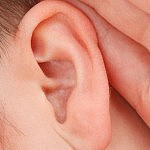The Potential of Gene Therapy to Restore Hearing Loss
 Imagine that you are born deaf and live in a world of silence – what price would you pay for a new treatment that might restore your hearing?
Imagine that you are born deaf and live in a world of silence – what price would you pay for a new treatment that might restore your hearing?
That is the market opportunity that may be available for biotechnology and pharmaceutical companies as the basic science around congenital hearing loss starts to yield insights that could translate into new products.
VGLUT3 is a gene involved with the transport of the neurotransmitter glutamate that is required by inner hair cells in order to generate neural responses to sound. Mice lacking VGLUT3 can’t hear.
Insertion of the VGLUT3 gene into mice cochlear cells resulted in restoration of hearing that lasted for 9 months (that’s a long time for mice). The authors noted that:
Over 50% of all human hearing loss is genetically based, and as tools to understand the human genome develop, scientists have been able to identify a number of genes associated with hearing loss.
Research in animal models is ongoing, with the potential in the future that we may be able to replace, repair or correct a defect a genetic mutation.
Could this lead to the restoration of human hearing? The answer is “yes”.
An accompanying editorial in Neuron by Donna Martin and Yehoash Raphael from The University of Michigan describes the work by Akil and colleagues as a major breakthrough:
There remain a number of challenges before gene therapy to correct human deafness becomes a reality, but biopharmaceutical companies such as GenVec (NASDAQ: GNVC) already see the market opportunity and potential for gene therapy to correct hearing loss. Novartis have a collaboration agreement with GenVec that is worth up to $213.6M in milestone payments.
The potential of gene therapy to restore hearing loss will offer hope to many with deafness. It is an exciting area to watch as innovative science translates into personalized medicine.
References
![]() Omar Akil, Rebecca P. Seal, Kevin Burke, Chuansong Wang, Aurash Alemi, Matthew During, Robert H. Edwards, & Lawrence R. Lustig (2012). Restoration of Hearing in the VGLUT3 Knockout Mouse Using Virally Mediated Gene Therapy Neuron, 283-293 DOI: 10.1016/j.neuron.2012.05.019
Omar Akil, Rebecca P. Seal, Kevin Burke, Chuansong Wang, Aurash Alemi, Matthew During, Robert H. Edwards, & Lawrence R. Lustig (2012). Restoration of Hearing in the VGLUT3 Knockout Mouse Using Virally Mediated Gene Therapy Neuron, 283-293 DOI: 10.1016/j.neuron.2012.05.019
Donna M. Martin, & Yehoash Raphael (2012). Have You Heard? Viral-Mediated Gene Therapy Restores Hearing Neuron, 75, 188-190 DOI: 10.1016/j.neuron.2012.06.008
5 Responses to “The Potential of Gene Therapy to Restore Hearing Loss”
While I agree that this is a significant step forward for gene delivery to the inner ear, the overwhelming cause of sensorineural hearing loss is from noise exposure, which causes apoptosis of hair cells. The real advance will be to synthesize de novo hair cells in a damaged inner ear.
This is a great discovery and like David says, a significant step, in the right direction.
That’s amazing news, and will give hope to many. I’m aware there is a large Deaf community who would not wish their hearing to be restored, but I suspect there are also a great many who would like that option. Let’s hope further progress is made.
Have GNVC and NVS announced any progress on their programs? That deal was announced some time ago now
What a breakthrough! Very exciting.
Comments are closed.